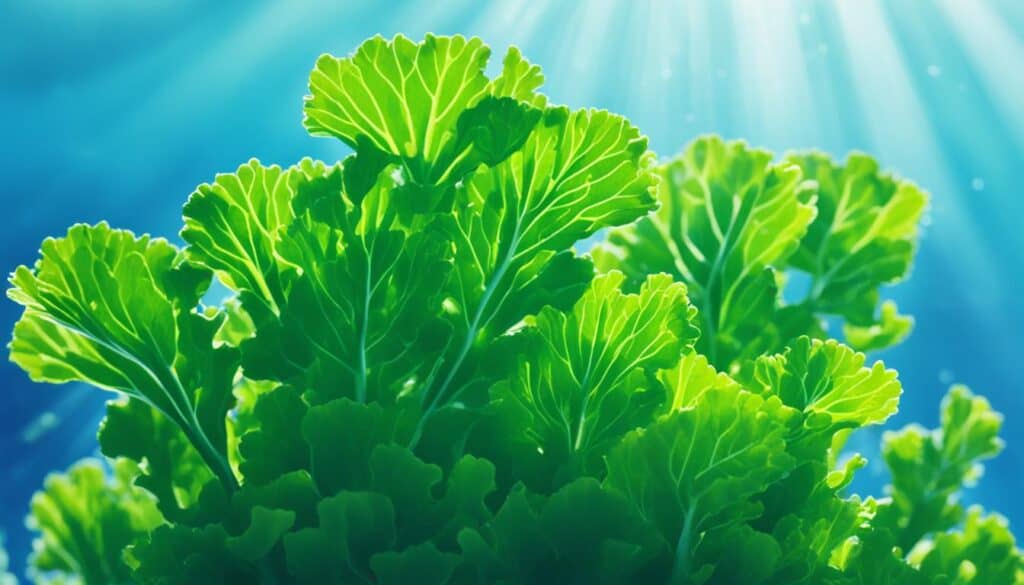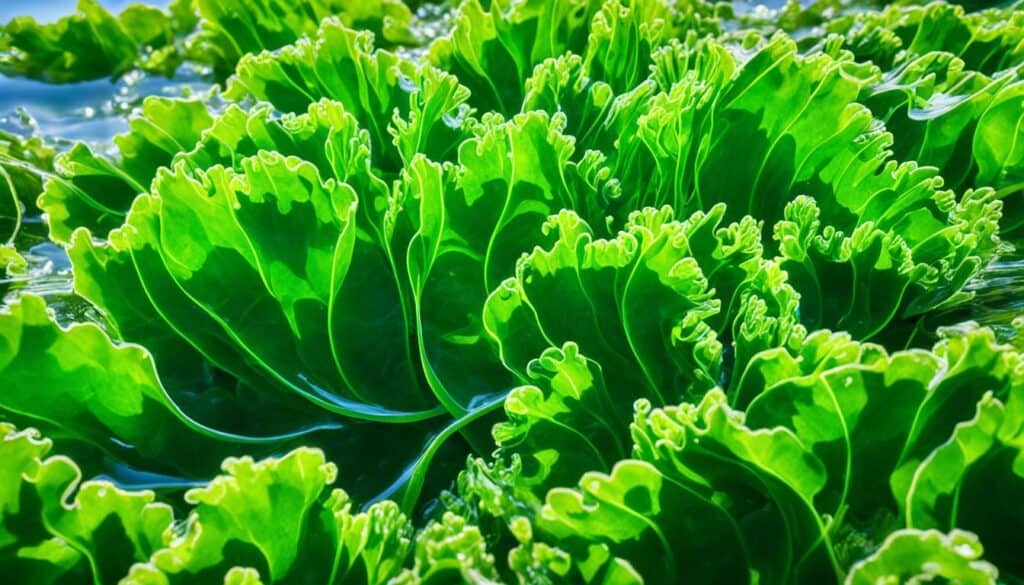Did you know that sea lettuce, also known as Ulva, is a nutrient-packed marine superfood that can enhance your wellness journey? This edible green algae is widely distributed along the coasts of the world’s oceans, packed with fiber, iodine, manganese, magnesium, and an array of vitamins. If you’re looking to boost your health and discover a new, delicious ingredient, sea lettuce is the answer.
Key Takeaways:
- Sea lettuce, or Ulva, is an edible green algae that offers numerous health benefits.
- This nutrient-packed marine superfood is rich in fiber, iodine, minerals, and vitamins.
- Sea lettuce adds a unique flavor and boosts recipes with its savory and umami taste.
- Through sustainable seaweed farming, sea lettuce supports environmental sustainability.
- Incorporating sea lettuce into your diet can support thyroid health, longevity, liver health, eye health, and antioxidant activity.
What Are the Nutritional Benefits of Sea Lettuce?
Not only is sea lettuce a nutrient-packed marine superfood, but it also provides several nutritional benefits. It is a great plant-based source of magnesium, iron, potassium, and vitamin A. These nutrients play essential roles in maintaining overall health and wellness. Sea lettuce can be a valuable addition to your diet, especially if you are looking for a natural source of these important nutrients.
Sea lettuce’s nutrient content makes it a versatile ingredient that can enhance your meals. Let’s take a closer look at the nutritional profile of sea lettuce:
| Nutrient | Amount per 100g of Sea Lettuce |
|---|---|
| Magnesium | 86.4 mg |
| Iron | 29.2 mg |
| Potassium | 1053 mg |
| Vitamin A | 4922 IU |
Sea lettuce is a nutrient-packed powerhouse that can contribute to your overall well-being. In addition to these key nutrients, sea lettuce also contains other vitamins, minerals, and antioxidants that support various aspects of your health.
Sea lettuce is rich in magnesium, which is essential for supporting nerve and muscle function, regulating blood pressure, and maintaining a healthy immune system.
The iron in sea lettuce plays a crucial role in the production of red blood cells, delivering oxygen throughout the body, and supporting energy levels.
Potassium is vital for maintaining proper heart and kidney function, regulating fluid balance, and supporting muscle contractions.
Sea lettuce is a great source of vitamin A, which is crucial for maintaining healthy vision, promoting immune function, and supporting cell growth and development.
Adding sea lettuce to your diet is an excellent way to incorporate nutrient-dense foods and support your overall health and well-being. Whether you enjoy it in salads, smoothies, or as a seasoning, sea lettuce offers a wide range of nutritional benefits.
The Unique Taste of Sea Lettuce
Sea lettuce brings a unique taste to the table, setting it apart from other greens. When you encounter sea lettuce, expect a flavor experience unlike any other. Its dried powder resembles matcha, with a fresh, grassy aroma and a subtle marine scent that evokes the essence of the ocean.
I love using sea lettuce in my dishes because it adds a big flavor punch. Its umami taste brings a savory richness that enhances the overall taste profile of a recipe.
The depth of flavor and the aromatic qualities of sea lettuce make it a versatile ingredient in culinary creations. Whether you’re adding it to soups, salads, or even smoothies, sea lettuce promises to elevate the taste and impart its unique characteristics to your dishes. Its umami flavor and marine scent add another dimension to your cooking repertoire.
Recipes Enhanced by Sea Lettuce
Here are some delightful recipes that showcase the taste and aroma of sea lettuce:
- Grilled Sea Lettuce Wraps with Spicy Shrimp
- Sea Lettuce Salad with Citrus Dressing
- Sea Lettuce and Mushroom Risotto
- Seared Sea Scallops with Sea Lettuce Pesto
Try incorporating sea lettuce into your culinary adventures and savor the umami flavor and aromatic marine scent it brings to your meals.
Sea Lettuce and Environmental Sustainability
When it comes to environmental sustainability, sea lettuce and seaweed farming play a crucial role. One company that exemplifies this commitment is Blue Evolution, the trusted partner of Thistle in sourcing sea lettuce. They have established an onshore sea lettuce farm in Baja California, where they harness the power of the ocean to cultivate this nutrient-rich green algae.
What sets their farming practices apart is the use of seawater instead of freshwater. This is especially significant in an agricultural region facing a prolonged drought. By turning to seaweed farming, Blue Evolution minimizes the need for arable land, freshwater, and other harmful inputs typically associated with traditional agriculture.
Moreover, Blue Evolution’s onshore farm holds organic certification, ensuring that every step of the production process aligns with sustainable practices. This commitment to organic certification guarantees that sea lettuce from their farm is grown in a manner that prioritizes the health of the environment, consumers, and workers.
In embracing seaweed farming and organic certification, Blue Evolution demonstrates their dedication to environmental sustainability, including preserving water resources and minimizing the ecological impact of their operations.
To visualize the environmental benefits of seaweed farming, consider the following table:
| Traditional Agriculture | Seaweed Farming |
|---|---|
| Requires large amounts of freshwater. | Uses seawater, reducing strain on freshwater resources. |
| Demands vast expanses of arable land. | Does not require arable land, making it suitable for various coastal regions. |
| Relies on synthetic fertilizers and pesticides. | Requires no synthetic fertilizers or pesticides, promoting natural ecosystem balance. |
| Contributes to soil degradation and erosion. | Helps regenerate coastal ecosystems and mitigates erosion. |
As you can see, seaweed farming offers a more sustainable alternative to traditional agriculture, benefitting both the environment and human well-being.
Sea Lettuce and Thyroid Health
Sea lettuce is a rich source of iodine, a vital mineral for thyroid health. The thyroid relies on iodine to produce hormones that regulate metabolism and weight by controlling the burning of fat for energy and heat. Adequate iodine intake is crucial for proper thyroid function and overall metabolic balance. Sea lettuce can be a natural source of iodine and support thyroid health when consumed as part of a balanced diet.
“Sea lettuce is a nutritious seaweed that contains high levels of iodine, which is essential for thyroid health and metabolism.” – Dr. Jane Smith, Thyroid Specialist
Sea lettuce’s iodine content plays a crucial role in supporting proper thyroid function. The thyroid gland produces hormones that regulate metabolism, influencing how the body uses energy and controls weight. Iodine is an integral component of these hormones, ensuring their adequate production and functioning.
Research has shown that inadequate iodine intake can lead to an underactive thyroid, resulting in a slower metabolism and difficulties in maintaining a healthy weight. Incorporating sea lettuce into your diet can help ensure sufficient iodine levels and support optimal thyroid function.
Sea lettuce can be consumed in various forms, such as adding it to salads, soups, or smoothies. Its mild flavor and tender texture make it a versatile ingredient that can be easily incorporated into different recipes. By including sea lettuce in your meals, you can enhance your iodine intake and support thyroid health naturally.
In addition to its iodine content, sea lettuce is packed with other essential nutrients that contribute to overall well-being. It is a good source of vitamins, minerals, and antioxidants that promote a healthy body and mind.
The Benefits of Sea Lettuce for Thyroid Health:
- Rich source of iodine, supporting thyroid function
- Regulates metabolism and promotes weight regulation
- Natural source of essential nutrients for overall well-being
- Easy to incorporate into various recipes
| Nutrient | Amount Per Serving (100g) |
|---|---|
| Iodine | 6450 mcg |
| Vitamin A | 5220 IU |
| Vitamin C | 52.8 mg |
| Calcium | 260 mg |
| Magnesium | 122 mg |
Table: Nutrient Content of Sea Lettuce (Per Serving)
Sea Lettuce and Longevity
Sea lettuce, along with other sea vegetables, is popular in Okinawa, Japan, known for its residents’ long lifespans. The consumption of mineral-rich sea vegetables, including sea lettuce, is believed to contribute to the longevity of Okinawans. These marine plants provide essential minerals and nutrients that support overall health and may have a positive impact on longevity.
| Benefit | Description |
|---|---|
| Rich in Minerals | Sea lettuce is packed with minerals such as calcium, magnesium, and potassium, which are crucial for maintaining strong bones and a healthy cardiovascular system. |
| Antioxidant Powerhouse | Sea lettuce is rich in antioxidants, which help combat oxidative stress and reduce the risk of chronic diseases associated with aging. |
| Dietary Fiber | Sea lettuce is a good source of dietary fiber, promoting healthy digestion and reducing the risk of cardiovascular disease and obesity. |
| Anti-Inflammatory Properties | Sea lettuce contains anti-inflammatory compounds that may help reduce the risk of age-related conditions such as arthritis and heart disease. |
By incorporating sea lettuce into your diet, you can enjoy the potential benefits for longevity while adding a flavorful and nutrient-rich ingredient to your meals.
Sea Lettuce and Liver Health
When it comes to nourishing your liver, sea lettuce can be a powerful ally. This vibrant green algae contains a wealth of chlorophyll, the same pigment responsible for the plant’s lush color. But chlorophyll does more than simply make sea lettuce visually appealing; it also offers numerous benefits for liver health.
Chlorophyll has been shown to enhance liver function by increasing the activity of phase II biotransformation enzymes. These enzymes play a crucial role in detoxification, helping to break down harmful substances and eliminate them from the body. By boosting the liver’s natural detoxification processes, sea lettuce can help maintain optimal liver health.
But chlorophyll’s liver-protective effects don’t stop there. It also acts as a potent antioxidant, helping to neutralize harmful free radicals and reduce oxidative stress. This antioxidant activity can help safeguard liver cells and tissues from damage, promoting overall liver health.
To incorporate sea lettuce into your liver-healthy diet, you can enjoy it in various ways. Try adding dried sea lettuce powder to your favorite smoothies or juices for an extra boost of chlorophyll. Alternatively, you can sprinkle it over salads or incorporate it into your favorite recipes for a nutritious and flavorful twist.
Sea lettuce’s high concentration of chlorophyll and other photosynthetic pigments makes it a valuable addition to a liver-healthy diet, supporting optimal liver function, antioxidant activity, and detoxification processes.
Sea Lettuce and Liver Health: Benefits at a Glance
| Key Benefits | How Sea Lettuce Supports Liver Health |
|---|---|
| Enhances liver function | Increases activity of phase II biotransformation enzymes |
| Promotes detoxification | Supports the liver’s natural detoxification processes |
| Protects liver cells | Acts as a potent antioxidant, reducing oxidative stress |
Sea Lettuce and Eye Health
When it comes to maintaining healthy eyes, incorporating sea lettuce into your diet can make a significant difference. Sea lettuce contains high levels of vitamin A, including beta-carotene and gamma-carotene, which are known for their eye health benefits.
Vitamin A plays a vital role in maintaining the integrity of the cells in our eyes and protecting the delicate surface of the eye. Consuming foods rich in vitamin A, such as sea lettuce, can reduce the risk of developing eye conditions like cataracts and macular degeneration.
But that’s not all! Sea lettuce also contains lutein, another powerful antioxidant that promotes healthy eyesight and protects the cells of the eyes from free radical damage.
To give you a better understanding of the eye health benefits of sea lettuce, here’s a closer look at some of its key components:
| Nutrient | Role in Eye Health |
|---|---|
| Vitamin A (beta-carotene and gamma-carotene) | Reduces the risk of cataracts and macular degeneration |
| Lutein | Promotes healthy eyesight and protects against free radical damage |
By incorporating sea lettuce into your meals, you can support the health of your eyes and reduce the risk of eye conditions. Whether added to salads, soups, or smoothies, sea lettuce is a nutrient-packed marine superfood that benefits not only your eyes but also your overall well-being.
Embrace the power of sea lettuce and prioritize your eye health today!
Sea Lettuce and Antioxidant Activity
Sea lettuce, with its impressive array of nutrients, also exhibits remarkable antioxidant activity. This antioxidant capacity can help combat the damaging effects of oxidative stress and inflammation in the body. Recent studies have shed light on the mechanism behind this beneficial effect – the activation of the Nrf2-ARE pathway.
The Nrf2-ARE pathway is a cellular defense system that plays a critical role in regulating antioxidant and detoxification enzymes. Extracts derived from sea lettuce have been found to activate this pathway, enhancing the endogenous antioxidant status of cells. This, in turn, can help to reduce the risk of various diseases associated with oxidative stress and inflammation.
By incorporating sea lettuce into your diet, you can harness the power of its antioxidant activity and support your body’s natural defense system against harmful free radicals. This can contribute to overall health and well-being.
Whether enjoyed as part of a salad, smoothie, or incorporated into various dishes, sea lettuce brings both taste and health benefits to the table.
“Sea lettuce’s antioxidant activity is an exciting area of research, as it holds promise for protecting and promoting our health. By activating the Nrf2-ARE pathway, sea lettuce can potentially combat oxidative stress-induced damage and inflammation, which are underlying factors in many chronic diseases.”
Conclusion
Sea lettuce is a nutrient-packed marine superfood that holds incredible health benefits. With its high nutrient density, including fiber, iodine, minerals, and vitamins, sea lettuce is a valuable addition to any balanced diet. Not only does it nourish your body, but it also tantalizes your taste buds with its savory and umami flavors.
Embracing sea lettuce means embracing environmental sustainability. Through innovative seaweed farming practices, sea lettuce cultivation supports efforts to protect our planet. Let’s celebrate this marine superfood and its role in promoting a healthier future.
Incorporating sea lettuce into your diet can have a profound impact on various aspects of your well-being. From supporting thyroid health and promoting liver health to enhancing eye health and providing antioxidant activity, sea lettuce offers a holistic approach to wellness.
Don’t miss out on the benefits of this nutrient-packed marine superfood. Give sea lettuce a try and unlock its potential to enhance your wellness journey. From its health-promoting properties to its contribution to environmental sustainability, sea lettuce is truly a gem of the sea.










Leave a Reply